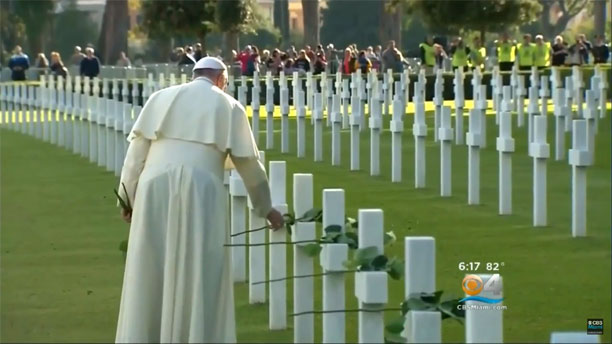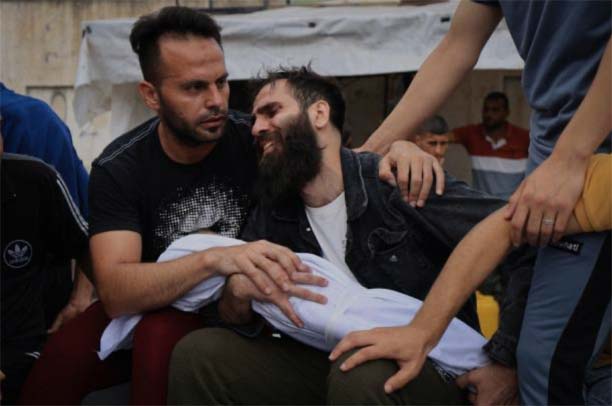| « Lavender Protocol: The Algorithm That Kills by Proxy | American strategists fearing war with Russia » |
Religion and Brutality Addressed
By Sally Dugman
Quite some years ago, I overheard some theology students in a hot debate. Some of them were claiming that God could only be two of three traits — a triad — assigned to him. It went like this:
If God were all seeing, all powerful and all loving — he, she, it or they wouldn’t allow evil (brutality, murder and related “bad” behaviors) to take place. However and if God were all seeing and all powerful, but not all loving, he wouldn’t care about whom were getting brutalized and killed off prematurely.
Likewise if God were all seeing and all loving, but not all powerful — God might not be able to fix about wrongful actions taking place. So the world could still be vicious and God would not address it as such.
Then, the small group of around five or six seminary students went on to discuss the Just War Theory and it went something like this:
St. Thomas Aquinas came up with this theory as a way to discern whether war, a last resort in conflict situations, should be carried out by religiously devoted people. And of course, Jesus never said, supposedly, that you can and should kill others under “special” circumstances.
Additionally, St. Thomas Aquinas, apparently, came up with this set of rules about murder as lots of young Christian men, who were of the age for conscription or who could willingly join a military troop for a steady salary, wondered about the topic since they were taught that Jesus taught that “thou shalt not kill” period — as an absolute dictate rather than it being allowable under some circumstances and not others — such as when your “side” in a war is being carried out in order to steal land or resources from the owning group.
Moreover, attacks should only be directed toward true military marks and never civilians or their property. … To learn more of this revision of Jesus’s views, please feel free to check out Conditions of A Just War and be mindful, too, of this Biblical dictate:
“He shall judge between the nations, and set terms for many peoples. They shall beat their swords into plowshares and their spears into pruning hooks; One nation shall not raise the sword against another, nor shall they train for war again.”
—Isaiah 2:4
So, years after hearing that discussion, I had a friend who was a Catholic priest who I’d first met when we both were doing the same volunteer work helping with providing donated food to the financially poor. So he was considered very valuable due to his heavy, unbridled commitment to serve those in need.
Therefore, the Bishop of the Diocese put him as second in command of a toney church in a well-to-do town of mostly highly educated professionals. At the same time, Bush Junior’s (the Shrub’s) war on Iraq had just started and my friend managed to slip in his thoughts that he didn’t approve of the Just War theory when he was giving mass.
Besides, he went on to add, this is hardly a just war since it’s based on two lies with one being that there are no weapons of mass destruction and Iraqis having nothing to do with 9/11, while both the U.S. President and the Vice President are hinting that Iraq was responsible for that carnage.
Well, the response that my friend got from stating that was stony silence. This was because a good proportion of the congregation had relatives fighting in Iraq, including sons and daughters, husbands or wives. So such talk made them uncomfortable, threatened and confused. On account, they complained to the Bishop — a whole bunch of them. Then, my friend told me that he was removed to a new job to take care of troubled Hispanic teenage youths with the goal of helping them not join a particularly vicious gang of delinquents in Worcester city, but instead do studies and basketball with my friend, who said that he never coached basketball in his life and would now study the topic to learn his new role.
So, therefore, I lost track of this goodly man. This is because, with his new job, he no longer had free time to volunteer to help feed the close to being indigent people in our region.
Now fast forward: About three months after my former priest-friend left the church in the wealthy town, I found myself staring at my plate of food, my clothes (including leather shoes, gloves, belts and pocketbooks made, obviously, from animal skin), house, furniture, books and more while noting that, in a closed energy system such as we have on earth, everything alive would have to destroy other life to stay alive and have goods, and what kind of a God would set a plan like that in motion?
So I, once again, called the church where my friend use to work. This time, I got his replacement — a young Columbian priest sent to the USA for further training.
So I said to him that I had a question about God condoning death of some to serve others staying alive. I, also, mentioned that I wasn’t a Catholic, but was raised in a Quaker family.
He paused in silence for a few moments after my declaration. Then, he said that he would not talk with me.
Puzzled, I asked the reason why not.
He, next, responded that there was no point since I was slated to go to Hell since I wasn’t a Catholic. So I was, according to him, a waste of his time.
In any case, I appreciated his frank honesty in his response to me rather than being put-off, annoyed or angry. He, certainly, was truthful about where he stood in the whole matter.
So I reflected on his decency and inner strength to outright state his views for a few days. Then, I called another priest in another town. And this time, I got a somewhat elderly man and once again, I explained that I was not a Catholic, but wanted an opinion on church views regarding God and brutality — violence, along with telling him that life goes forward through theft of life of other species and our contending with members of our own species to get the goods for our own kind rather than for theirs — a happening that one sees again and again in war times, competition for jobs and much more.
Meanwhile, I went on to include that humans keep breeding more and more of their own kind and taking over more and more land and water bodies to serve most people’s desire to get rich while destroying other species, along with competitive to the point of being murderous toward members of their own in the process. So what, then, did he think of a loving God?
Further, we are spoiling so much of the world with our wanton, destructive and extractive ways.
His own attitude was very close to mine. For example, he said that he almost didn’t become a priest and struggled with the idea of survival of the fittest in terms of that being one of the basic features and principles guiding biological evolution, and, further, who was he to question God’s wisdom or capabilities? So he, basically, concurred that brutality in a closed energy system is, indeed, vicious and violent while also unfair, and unjust (such as the ways that animals, unable to move at all or switch lying on one particular side, are poorly treated on many factory farms.
Moreover, it is clear that humans are one of the fittest since we can subjugate many other species and make more and more of our own kind to overrun and control just about everything else (including the water supplies and use of land, as well as to some degree, climate considerations and which species will go extinct).
world population graph के लिए चित्र परिणाम
He went on to say that as he struggled with this dumbfounding awareness, the thought came up about what kind of person did he want to be in the mix to serve God and the mission that Jesus brought to humankind. So he decided that he had to become a priest, after all, since he wanted especially to bring goodness, relief, comfort and hope despite all that is shockingly horrid and ruthlessly inhumane in the setup of the way that life goes forward regardless of the reason fir being so.
He went on to conclude that especially since life is for some often so difficult and coldhearted, he especially felt even more sure that he wanted to bring love and comfort to others. After all, what else could he do in life other than share in joyous moments like marriage and baptism, help in confessionals for people who are struggling, and help with difficult moments of great sorrow and pain.
I, then, told him that I agreed. What else can we do while alive other than to try to improve the world as best as we can? What is a better task than trying to promote goodness as a main goal?-###-
Sally Dugman is a writer in MA, USA


